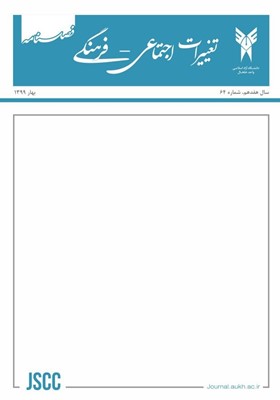بررسی جامعه شناختی ناپایداری تحولات دموکراتیک در ایران معاصر
محورهای موضوعی : خانوادهمحمود سلطانی عزت 1 , ابراهیم متقی 2 *
1 - دانشجوی دکتری جامعه شناسی سیاسی، واحد علوم و تحقیقات، دانشگاه آزاد اسلامی ، تهران، ایران
2 - استاد گروه علوم سیاسی، دانشگاه تهران، ایران
کلید واژه: جامعه مدنی, ماهیت دولت, دموکراسی شکننده,
چکیده مقاله :
این پژوهش با هدف شناسایی علل ناپایداری تحولات دموکراتیک در ایران معاصرانجام شد. چهار موج گذار به دموکراسی در ایران عبارتند از: انقلاب مشروطیت، نهضت ملی شدن نفت، انقلاب اسلامی 57 و جنبش اصلاحات. اما در هر مقطع ما شاهد واقعه دموکراسی شکننده هستیم. جهت تبیین این مسأله، صاحبنظران به طرح دیدگاههای خود پرداخته اند. تئوری تلفیقی ساموئل هانتینگتون با تأکید بر نقش قابلیت رهبران به عنوان عاملیت و تأثیر ماهیت دولت، جامعه مدنی و شرایط بین المللی به عنوان شرایط ساختاری در ایران معاصر، به عنوان تئوری راهنما در تحلیل کیفی مطرح شده است. از روش تاریخی- تطبیقی با جبر بولی استفاده شده است. نتیجه تحلیل کیفی این پژوهش قدرت تبیین وجه ساختاری تئوری هانتینگتون را نشان می دهد. هرچند که قابلیت رهبری و نفوذ و دخالت قدرت های بزرگی چون آمریکا، انگلیس و روسیه در تاریخ معاصر اثرگذار بوده اند اما شرط کافی برای تحکیم دموکراسی نبوده اند. در تحلیل نهایی، ضعف جامعه مدنی و شکنندگی ماهیت دولت (پاتریمونیالی، رانتیر و ایدئولوژیک) به عنوان شرط لازم و کافی واقعه دموکراسی شکننده در ایران معاصر مطرح است.
This study aimed to identify the causes of instability of democratic developments in contemporary Iran. The four waves of transition to democracy in Iran are: the Constitutional Revolution, the Oil Nationalization Movement, the Islamic Revolution 57, and the Reform Movement. But at every turn we are witnessing a fragile democracy. To explain this issue, experts have proposed their views. Samuel Huntington's integrated theory has been proposed as a guiding theory in qualitative analysis by emphasizing the role of leadership ability as a Agency And the influence of the nature of government, civil society and international conditions as structural conditions in contemporary Iran has been proposed as a guiding theory in qualitative analysis. The historical-comparative method with Boolean algebra has been used. The result of the qualitative analysis of this research shows the power of explaining the structural aspect of Huntington's theory. Although the ability to lead and influence the great powers such as the United States, Britain and Russia have been influential in contemporary history, But they have not been a sufficient condition for the consolidation of democracy. In the final analysis, the weakness of civil society and the fragility of the nature of the state (patrimonial, rentier and ideological) are considered as a necessary and sufficient condition for the event of fragile democracy in contemporary Iran.
_||_

